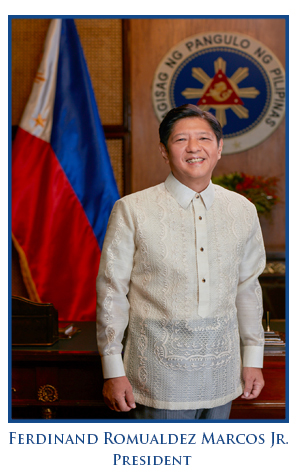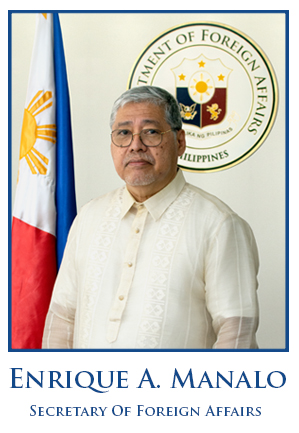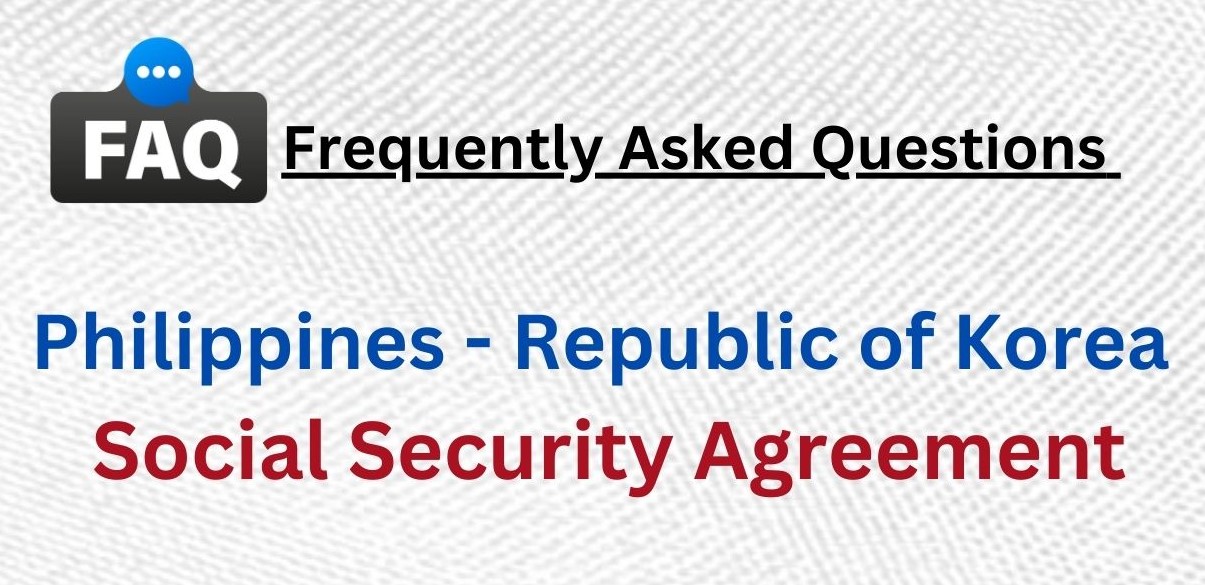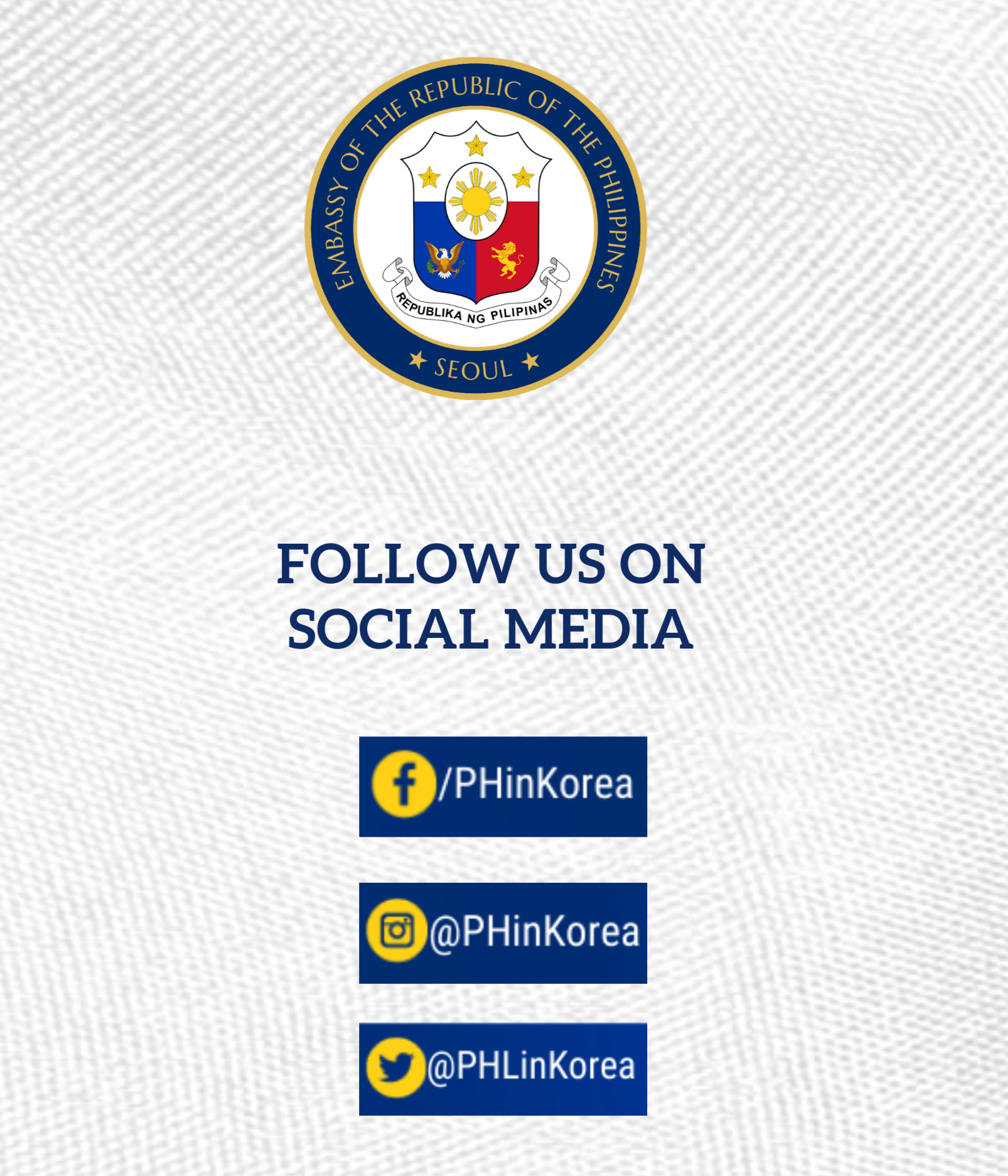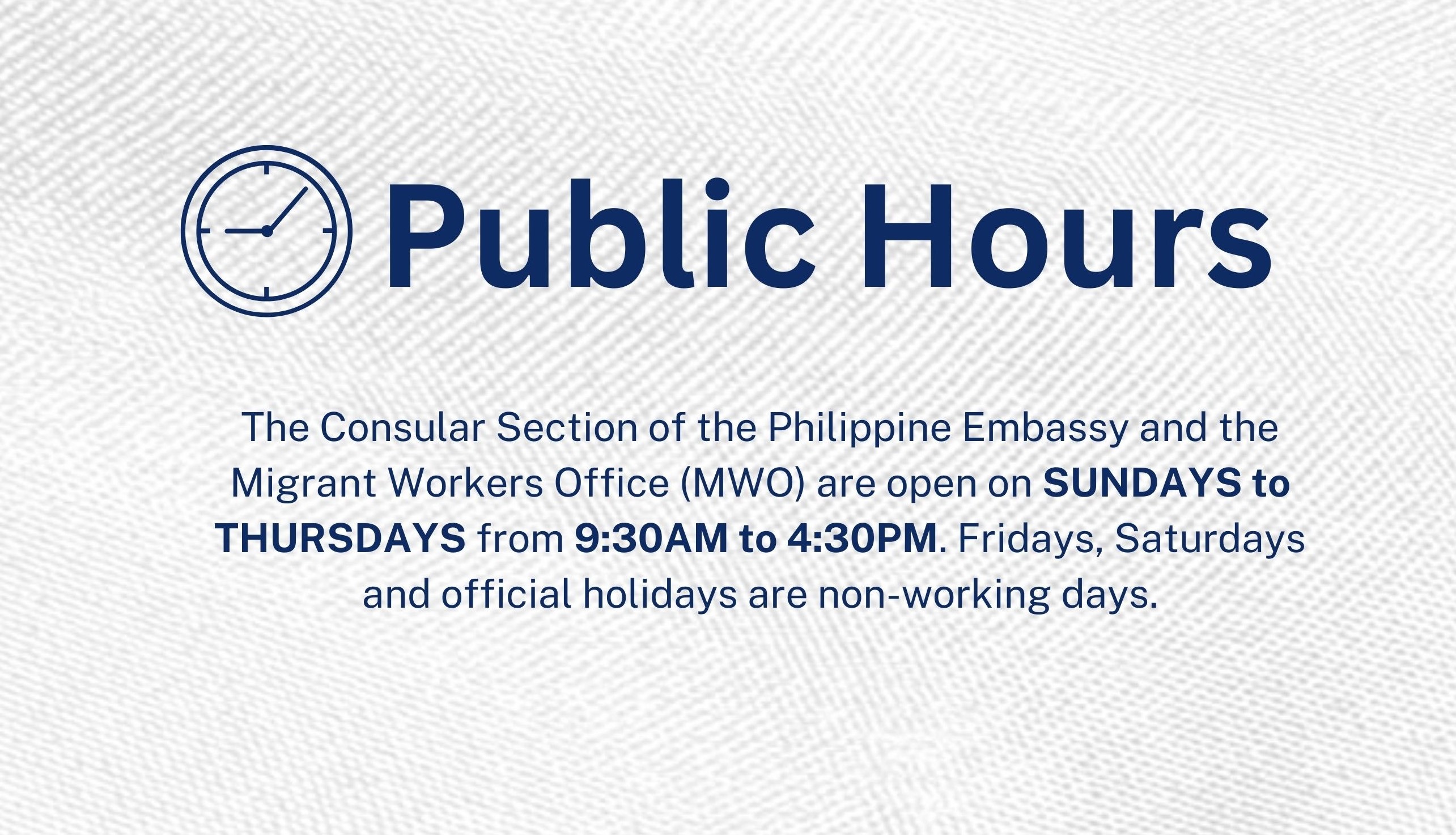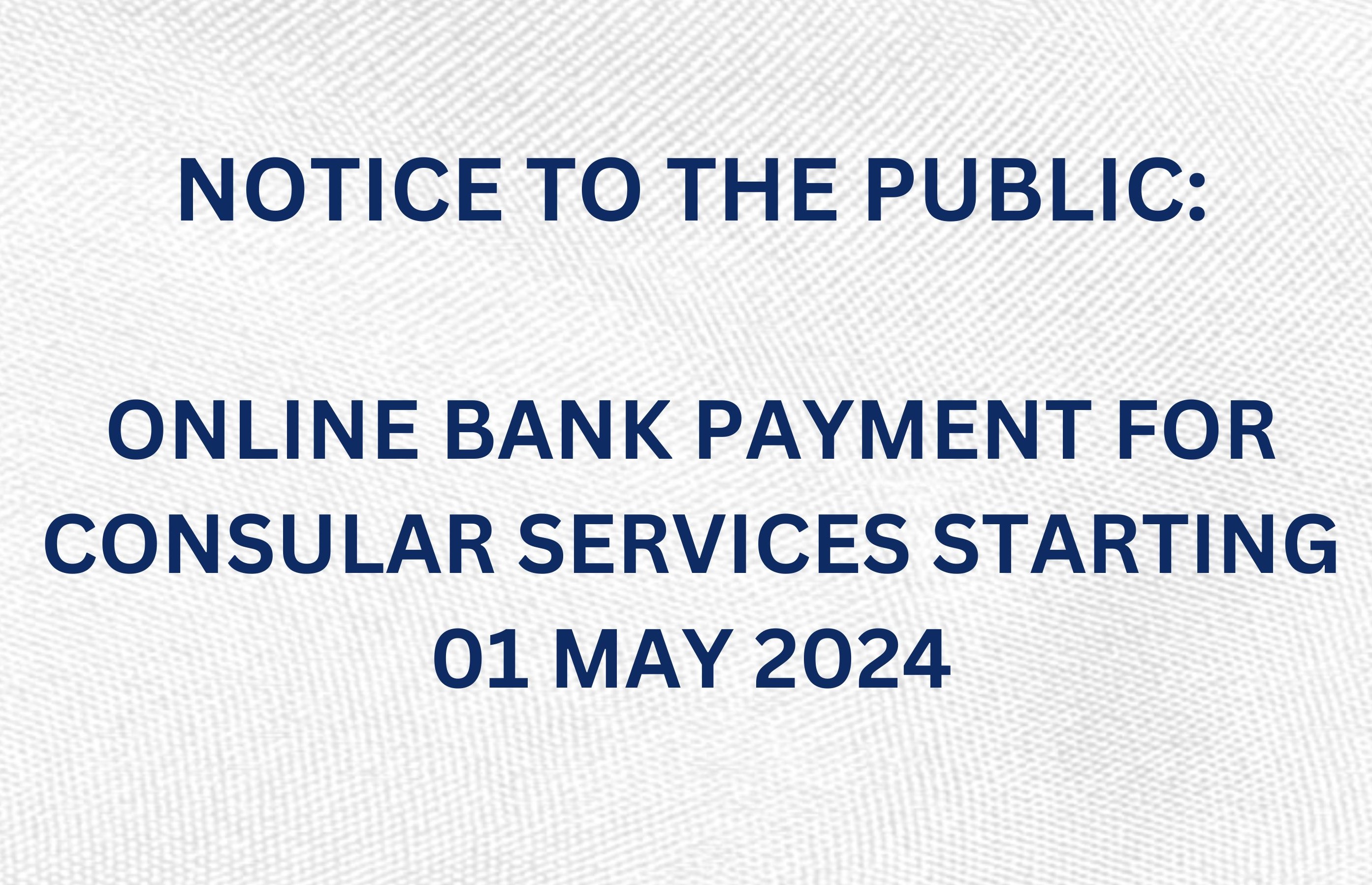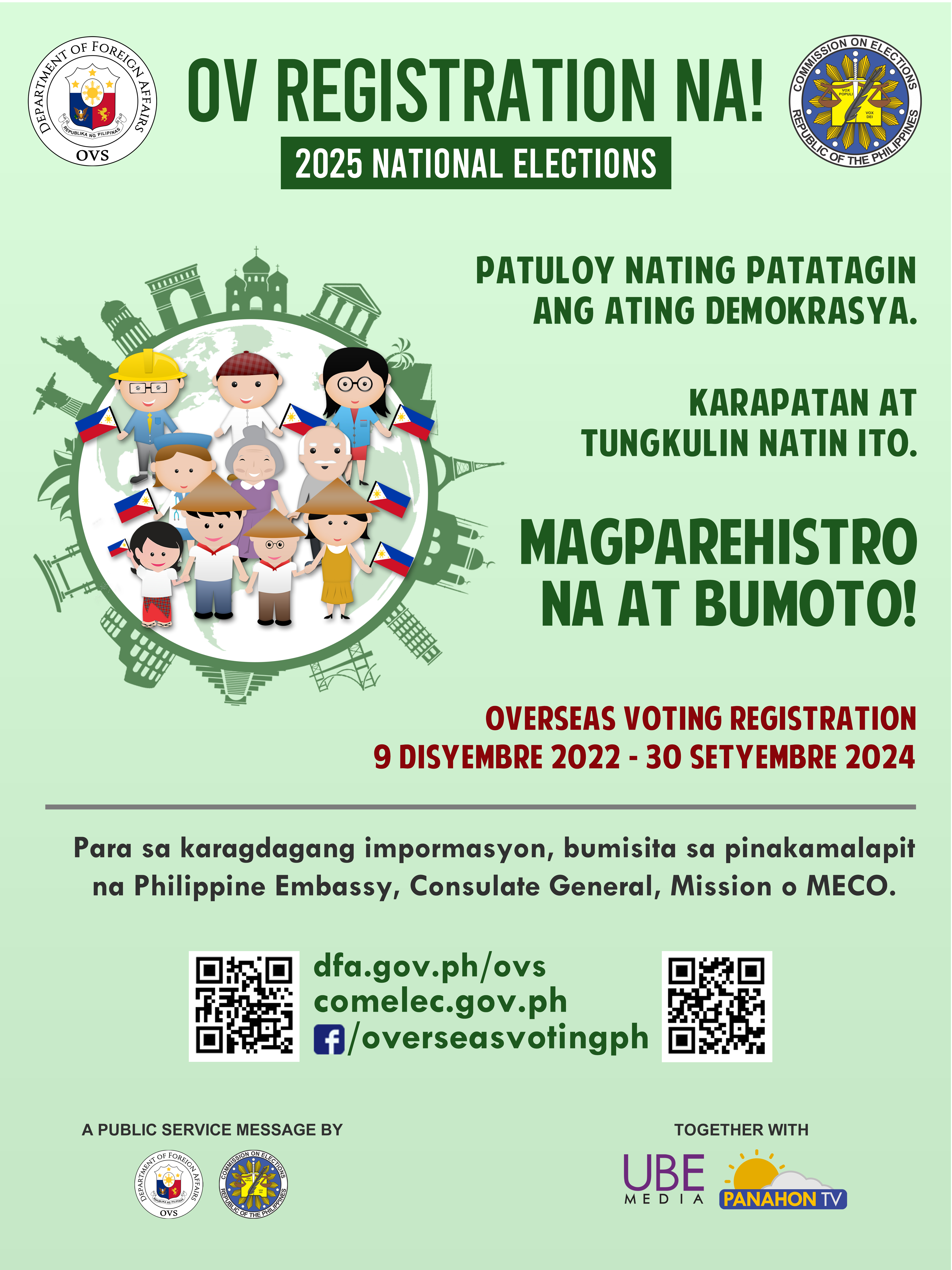Philippines Participates in 2024 BRIDGES Program on Local Infrastructure Governance in Korea
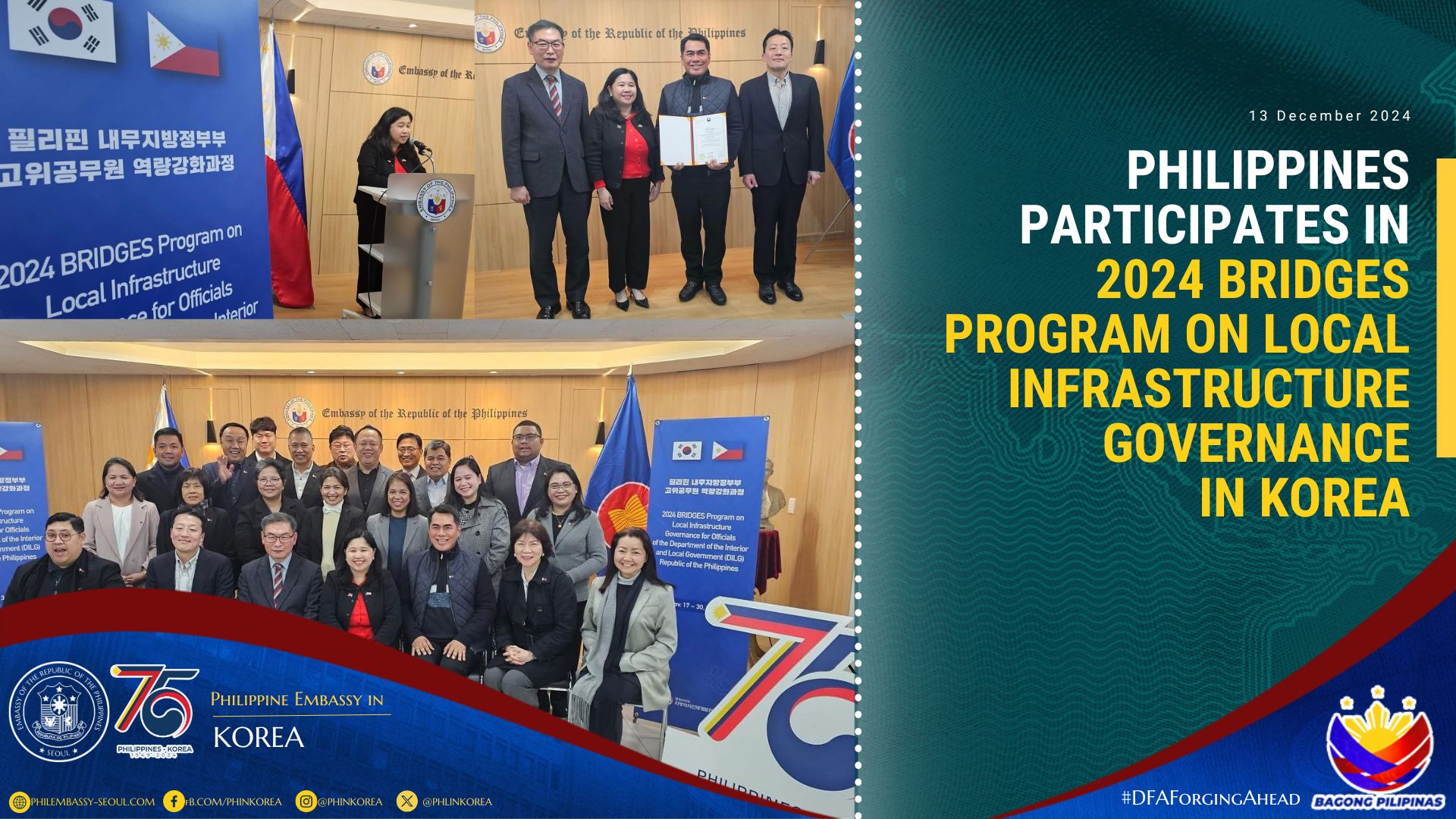
13 December 2024, Seoul. The 2024 Bridges Program on Local Infrastructure Governance was successfully held from November 24-30, 2024, in Seoul, South Korea. The program brought together experts and officials from the Philippines and Korea to exchange knowledge and best practices in local governance and infrastructure development. The program was co-organized by the Philippine Society for Public Administration (PSPA) and the Korea Local Government Officials Development Institute (LOGODI) under the ROK Ministry of Interior and Safety (MOIS), with additional support from the LX Spatial Information Research Institute.
Participants in the program included the Philippine delegation headed by Undersecretary Odilon Pasaraba of the Department of Interior and Local Government (DILG) and other DILG senior officials and directors specializing in local governance and infrastructure management. Korean counterparts included representatives from LOGODI, the LX Spatial Information Research Institute, and the ROK MOIS who contributed expertise and knowledge on local governance and smart city infrastructure in Korea.
The program included policy and knowledge exchange sessions, presentation of case studies, technical workshops, and site visits sites showcasing advanced local governance in action, including applications of spatial data technology in transportation and public safety systems.
The Closing Ceremony for the BRIDGES Program was held at the Sentro Rizal of the Philippine Embassy in Seoul with the DILG Delegation as well as representatives from ROK MOIS, LOGODI, and LX Spatial in attendance.
Ambassador Theresa Dizon-de Vega in her congratulatory remarks noted that the program will benefit local governance managers immensely as it introduced them to new technologies, tools, and strategies for better local infrastructure management. She likewise re-affirmed the Embassy’s commitment to helping engender more sub-national cooperation between the Philippines and Korea.
DILG Undersecretary Odilon Pasaraba expressed his gratitude for the opportunity to learn from Korea’s expertise, noting that the insights gained would play a crucial role in enhancing governance frameworks and infrastructure development initiatives in the Philippines. Undersecretary Pasaraba conveyed the DILG’s appreciation to the Embassy for helping to organize the closing ceremony and for its work on local government engagement between PH and ROK.
The 2024 Bridges Program underscored the importance of international cooperation in addressing the challenges of local governance and infrastructure development and marks another milestone in Philippines-Korea relations, fostering innovation and mutual growth in the field of public administration and infrastructure governance. END
Philippines Joins 3rd ASEAN+3 Economic Cooperation and Financial Stability Forum
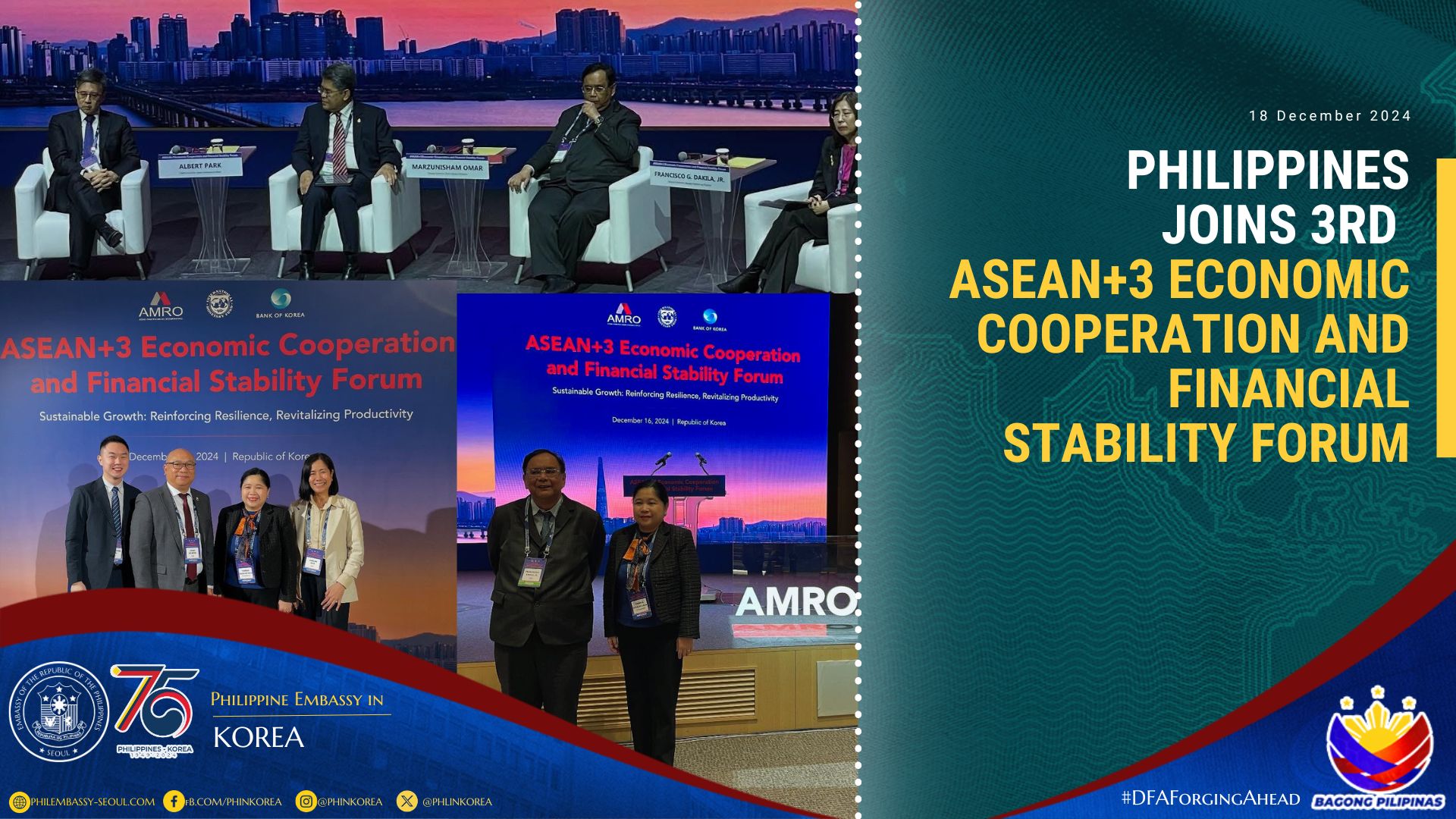
18 December 2024, Seoul. The Philippines participated in the 3rd ASEAN+3 Economic Cooperation and Financial Stability Forum, with the theme “Sustainable Growth: Reinforcing Resilience, Revitalizing Productivity,” convened on December 16, 2024, at the Bank of Korea in Seoul. Jointly organized by the ASEAN+3 Macroeconomic Research Office (AMRO), the International Monetary Fund (IMF), and the Bank of Korea. The forum gathered policymakers, academics, and experts to address the region’s economic challenges and explore pathways for sustainable development.
The Philippine delegation included Bangko Sentral ng Pilipinas (BSP) Deputy Governor Francisco G. Dakila, Jr., Department of Finance Undersecretary Joven Balbosa of the International Finance Group (DOF-IFG), and other finance officials. Philippine Ambassador Theresa Dizon-de Vega was likewise present at the forum.
The forum featured keynote messages and presentations from ROK Deputy Prime Minister and Minister of Economy and Finance Sang-mok Choi, AMRO Director Kouqing Li, Nobel Laureate for Economics Simon Johnson, IMF Director Krishna Srinivasan, Indonesian Finance Minister Sri Mulyani Indrawati, ADB President Masatsugu Asakawa and other distinguished experts.
BSP Deputy Government Dakila joined the Panel Session on “Macroeconomic Development and Prospects: Near-term Risks and Policy Directions” where panelists examined near-term risks to macro-financial stability and discussed policy directions to address these challenges.
The forum discussed the urgent need for enhanced economic and financial cooperation among ASEAN+3 countries in the face of evolving challenges and to secure sustainable growth. END
PHILIPPINE EMBASSY CONDUCTS BRIEFING FOR LOCAL EXECUTIVES PARTICIPATING IN THE FOREIGN STUDY MISSION ON LOCAL GOVERNANCE AND INNOVATION FOR ECONOMIC DEVELOPMENT
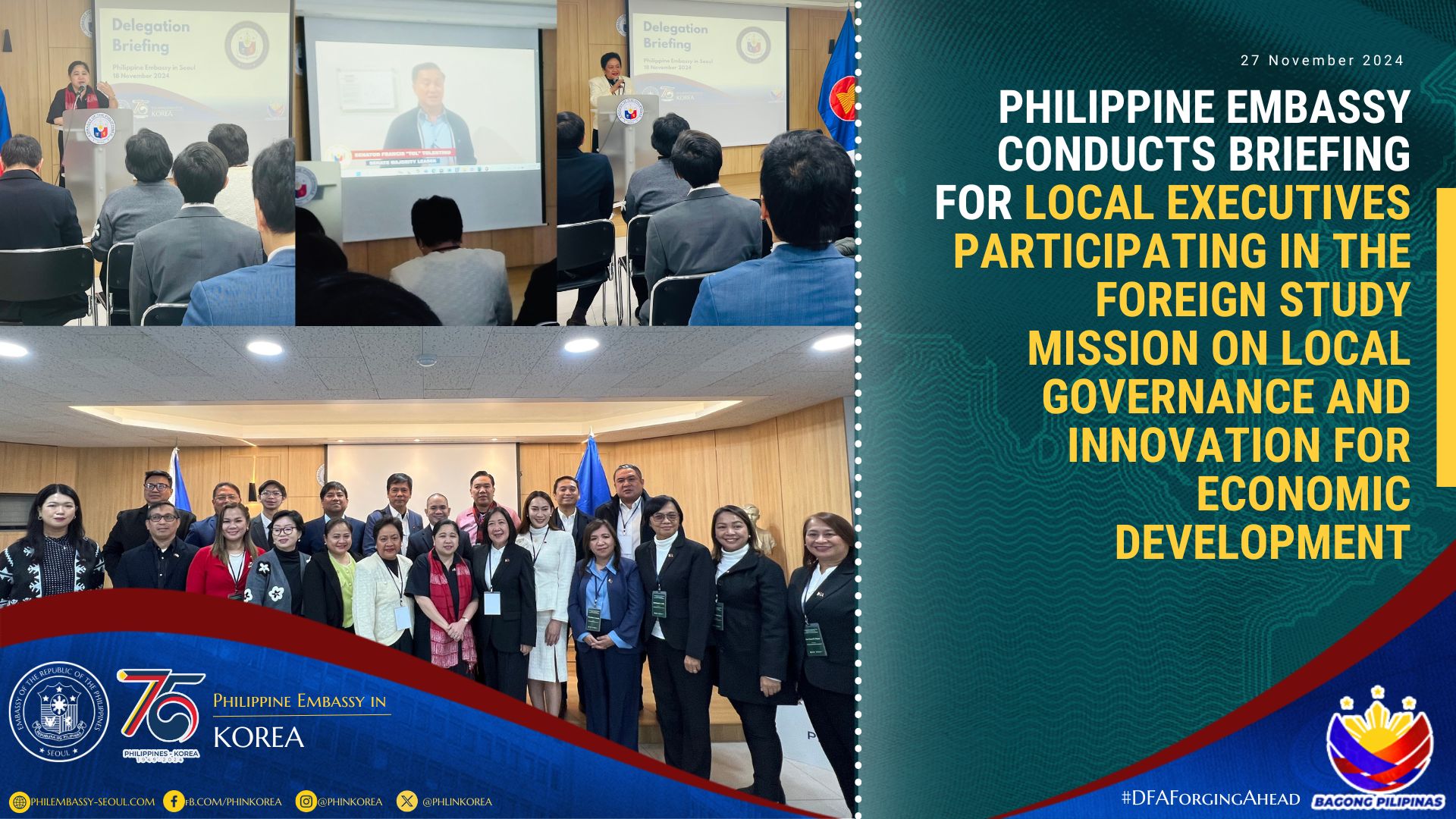 [Above photo L-R] Ambassador Theresa Dizon-De Vega welcomes the delegation to the Philippine Embassy in Seoul, screen recording of Senator Francis Tolentino’s message to the delegation and DAP VP Ms. Imelda Caluen delivering her remarks. [Below photo] Delegation poses for a photo with the Philippine Embassy officials Third Secretary and Vice Consul Reisha Olavario (first row, leftmost), Deputy Chief of Mission and Consul General Romulo Victor Israel Jr. (first row, second from left) and Ambassador Dizon-De Vega (first row, seventh from left)
[Above photo L-R] Ambassador Theresa Dizon-De Vega welcomes the delegation to the Philippine Embassy in Seoul, screen recording of Senator Francis Tolentino’s message to the delegation and DAP VP Ms. Imelda Caluen delivering her remarks. [Below photo] Delegation poses for a photo with the Philippine Embassy officials Third Secretary and Vice Consul Reisha Olavario (first row, leftmost), Deputy Chief of Mission and Consul General Romulo Victor Israel Jr. (first row, second from left) and Ambassador Dizon-De Vega (first row, seventh from left)
08 December 2024, Seoul – Philippine Embassy in Seoul officials led by Ambassador Theresa Dizon-De Vega received the courtesy call of the second batch of local chief executives and LGU officials participating in the 2024 KDIS-DAP Foreign Study Mission on Local Governance and Innovation for Economic Development at the Sentro Rizal Hall of the Philippine Embassy on 18 November 2024.
In her remarks, Ambassador Dizon De-Vega recognized the role of the LGUs as frontliners in terms of public service and stressed that sub-national cooperation is one of the thrusts of the Philippine Embassy. She wished the delegation a productive seminar as they engage with ROK institutions to broaden their knowledge on public governance.
Deputy Chief of Mission and Consul General Romulo Victor M. Israel Jr. shared that the Korean War serves as the cornerstone of the enduring relations of the Philippines and the Republic of Korea. Both countries also work hand-in-hand to constantly elevate the relationship into a mutually beneficial partnership. He also mentioned the milestone events for the Philippines and ROK such as the commemoration of the 75th Anniversary of bilateral relations and the State Visit of ROK President Yoon Suk Yeol to the Philippines.
In a video message, Senator Francis N. Tolentino who spearheaded the DAP Adaptive Governance and Innovation for Local Executives (AGILE) Program is confident that the participants will be able to absorb all the lessons they will learn from the study mission to enhance their leadership skills and be able to contribute to their respective LGUs.
Development Academy of the Philippines (DAP) Vice President Ms. Imelda Caluen mentioned the importance of drawing lessons from experiences of other countries and best practices that will help both local and national agencies shape policies for economic and sustainable development. The study mission will also serve as a platform for knowledge sharing, establishing networks and enriching the global experience of the participants.
Korea Development Institute School of Public Policy and Management Managing Director Ms. Yun Hai-Young shared that the KDI has been working with partners to design different types of learning opportunities for study missions to share ROK’s innovative and sustainable governance.
Delegation leader Vice Mayor Maria Caridad Goteesan of the Province of Samar shared that her province is also a recipient of various cooperation projects and development assistance from the ROK through the Korea International Cooperation Agency (KOICA).
Third Secretary and Vice Consul Reisha L. Olavario, Head of the Political and Economic Section of the Embassy presented an overview of Philippines and ROK bilateral relations highlighting the elevation of the bilateral relations to a Strategic Partnership and the ratification of the PH-ROK Free Trade Agreement. END
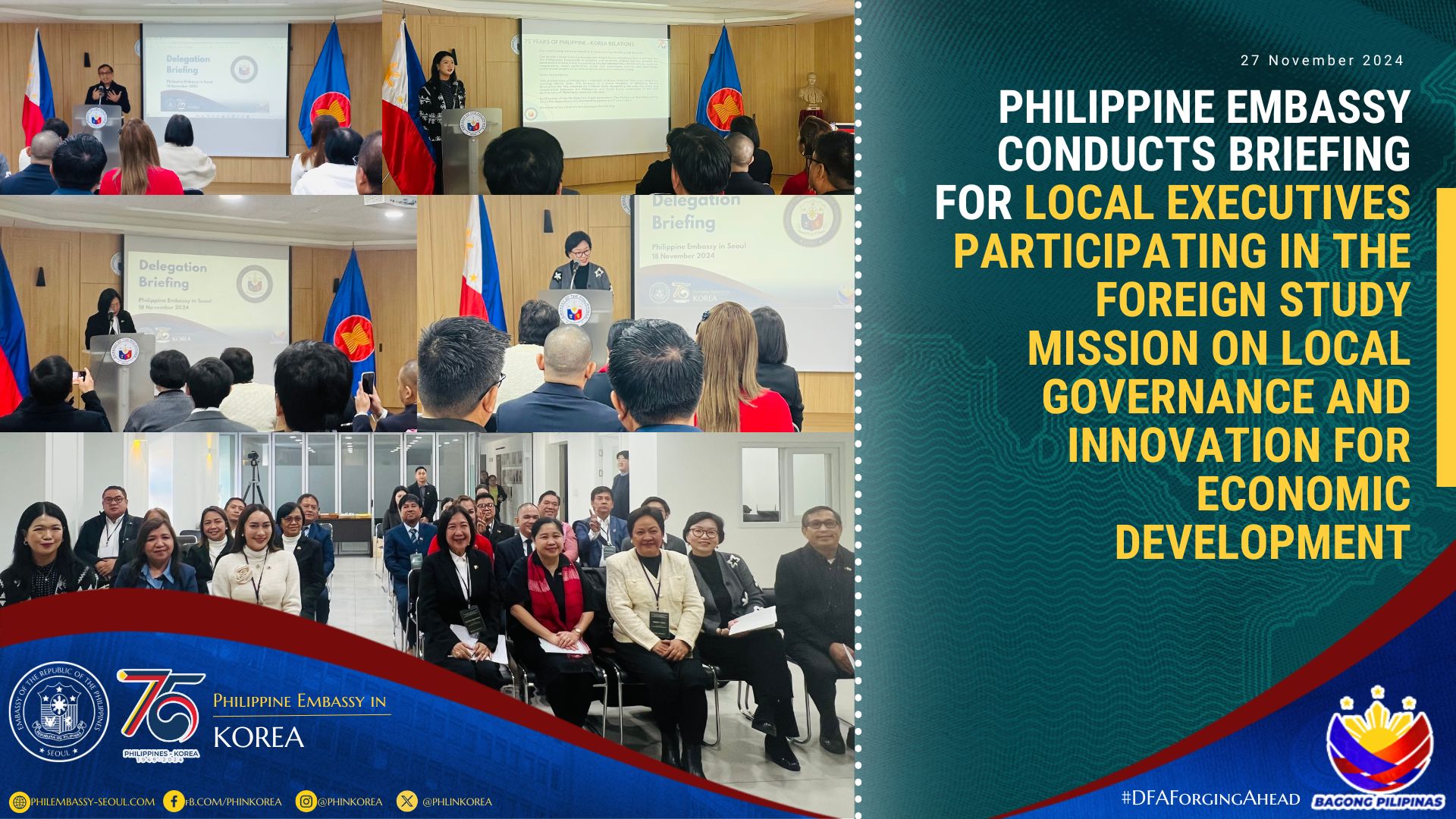 Deputy Chief of Mission and Consul General Israel Jr. shares milestone activities of PH-ROK with the delegation. Third Secretary and Vice Consul Olavario presents an overview of PH-ROK relations. Delegation leader Vice Mayor Goteesan of Eastern Samar and KDI Managing Director Yun sharing their messages to the delegation.
Deputy Chief of Mission and Consul General Israel Jr. shares milestone activities of PH-ROK with the delegation. Third Secretary and Vice Consul Olavario presents an overview of PH-ROK relations. Delegation leader Vice Mayor Goteesan of Eastern Samar and KDI Managing Director Yun sharing their messages to the delegation.
DILG-PPSC MASTER IN CRISIS AND DISASTER RISK MANAGEMENT (MCDRM) CLASS “MARAGHAWI” BENCHMARKS BEST PRACTICES OF THE REPUBLIC OF KOREA IN DISASTER PREPAREDNESS AND RESPONSE
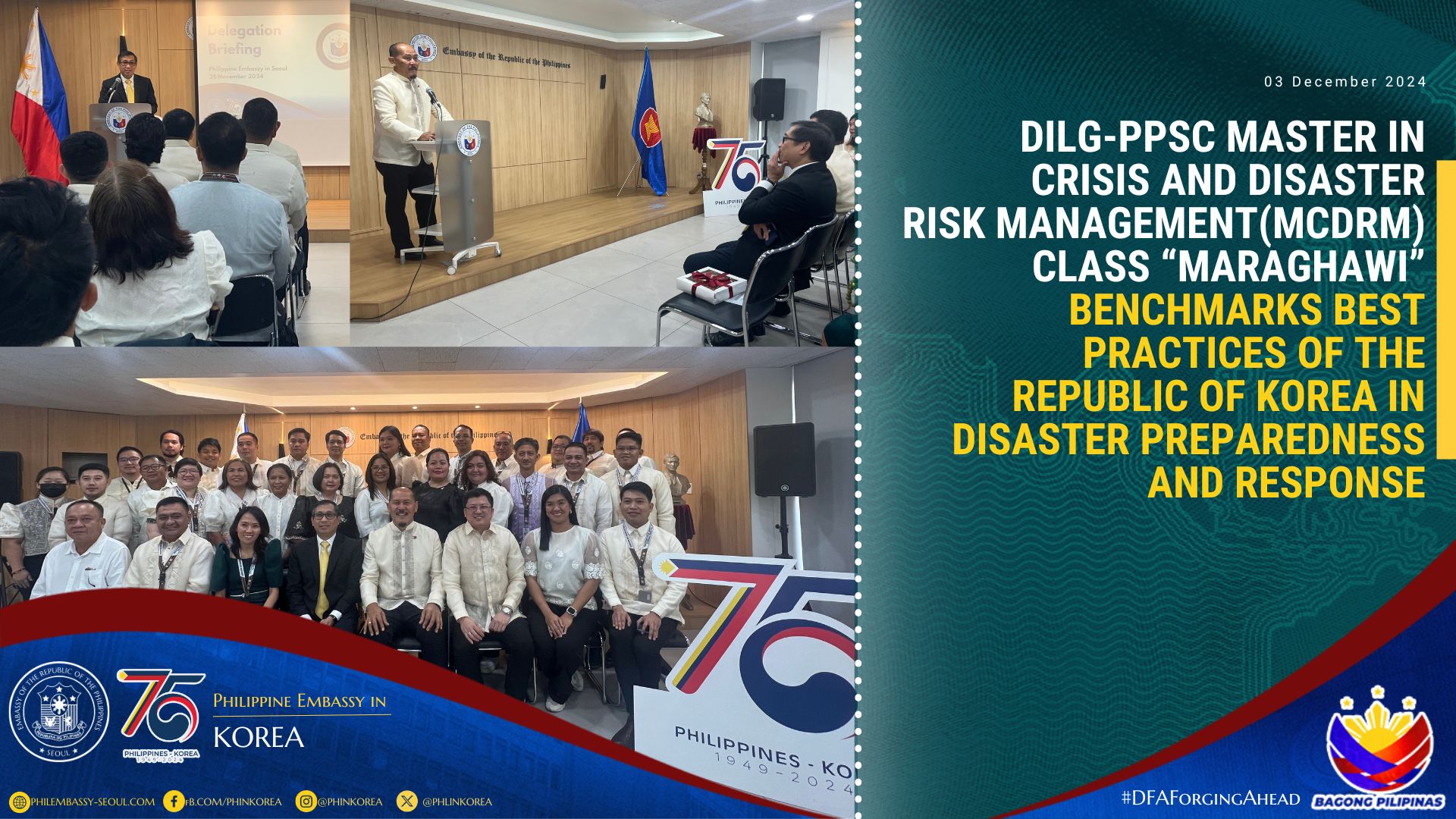
[Above photo, L-R] Deputy Chief of Mission and Consul General Romulo Victor M. Israel Jr. delivers remarks and a presentation on the role of the Embassy in disaster response to the members of the DILG-PPSC MCDRM delegation. Head of Delegation Director and Dean of the National Police College Romeo S. Magsalos, MPSA, Ph.D, DPSG expresses appreciation to the Embassy on behalf of the DILG PPSC MCDRM delegation. [Below photo] DILG-PPSC MCDRM Class “Maraghawi” pose for a group photo with Deputy Chief of Mission and Consul General Israel Jr.
03 December 2024, Seoul. On 25 November 2024, Deputy Chief of Mission and Consul General Romulo Victor M. Israel, Jr. of the Philippine Embassy in Seoul received the courtesy call of a delegation from the Department of the Interior and Local Government – Philippine Public Safety College (DILG-PPSC) Class “Maraghawi” who were conducting their International Field Exposure and Study (IFES) in the Republic of Korea from 23 to 29 November 2024.
During their courtesy visit, the Embassy welcomed the delegation and presented an overview of Philippines-ROK bilateral relations highlighting the milestone events in the year-long commemoration of the 75th Anniversary of diplomatic relations; the elevation of bilateral relations into a Strategic Partnership; and the signing of the Philippines-ROK Free Trade Agreement. DCM Israel likewise cited some best practices of ROK in disaster preparedness and pandemic response such as the (1) Seoul Metropolitan Government’s Transport Operation and Information Service (TOPIS) for road monitoring; (2) Smart City Integrated Platform a command center of smart cities providing real-time monitoring of crimes, accidents and traffic; (3) MOIS Integrated Disaster and Safety Information System; (4) Flood outbreak forecast and warning system; and (5) Emergency Ready App, a mobile application that provides early warning in case of impending disaster.
He also shared the Embassy’s role in disaster response for Filipinos in Korea that includes making representations with the ROK government to discuss Disaster Risk Cooperation; partnership with the Boramae Safety Experience Center, a renowned facility for emergency training; conduct of Filipino Leaders Camp which included a dedicated session on emergency preparedness wherein participants received valuable and practical information on contingency planning; and participation in the ROK Nationwide Civil Defense Drill conducted by the Ministry of Interior and Safety (MOIS), among others.
DILG PPSC MCDRM Head of Delegation Director and Dean of the National Police College Romeo S. Magsalos, MPSA, Ph.D, DPSG, expressed appreciation to the Embassy for welcoming the delegation and providing the briefing on its role in disaster response. He also shared that he continues to encourage DILG PPSC scholars to visit other countries to learn best practices that they can bring home to the Philippines.
Dedicated to enhancing disaster risk resilience and management in various national government agencies and local government units, the delegation also met with officials of the Korea Meteorological Administration (KMA), Gyeonggi-do Fire and Disaster Headquarters, Incheon City MCR2030 Resilient Hub and Incheon Free Economic Zone (IFEZ) and UNDRR Office for Northeast Asia and Global Education and Training Institute to learn about their programs and initiatives. They also visited the Boramae Safety Training Center on 27 November 2024, where they had hands-on simulated exercises on different kinds of disasters like fire, earthquake and typhoons. END
Embassy News
- Wednesday, 11 June 2025 President Ferdinand Marcos Jr. congratulates ROK President Lee Jae-Myung on his election
- Wednesday, 11 June 2025 PHILIPPINES COMMITS USD 20,000 TO SUPPORT GLOBAL VACCINE DEVELOPMENT
- Wednesday, 11 June 2025 SOUTHEAST ASIAN STUDENT LEADERS VISIT PHL EMBASSY FOR COURTESY CALL AND DIALOGUE
Announcement & News Updates
- Wednesday, 11 June 2025 REQUEST FOR QUOTATION FOR SUPPLY AND DELIVERY OF EMBASSY COMMEMORATIVE ROLLERBALL PENS AS TOKENS DURING OFFICIAL EVENTS
- Wednesday, 11 June 2025 REQUEST FOR QUOTATION FOR PROCUREMENT OF PHILIPPINE-MADE PRODUCTS AS TOKENS DURING THE 127TH PHILIPPINE NATIONAL DAY RECEPTION ON 23 JUNE 2025
- Wednesday, 11 June 2025 REQUEST FOR QUOTATION FOR SUPPLY AND DELIVERY OF PERSONALIZED EMBASSY TOKENS FOR THE 127TH PHILIPPINE NATIONAL DAY RECEPTION ON 23 JUNE 2025

